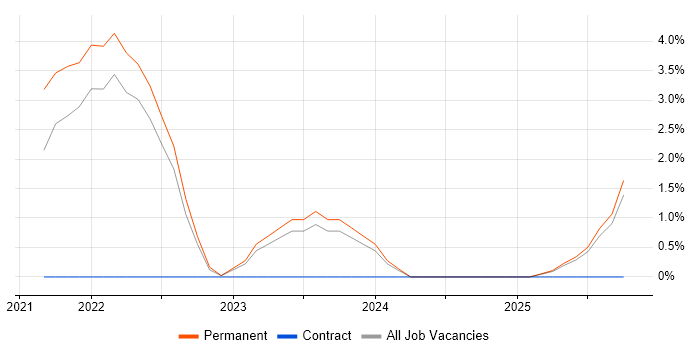Red Hat OpenShift
South London > Kingston Upon Thames
The table below provides summary statistics and salary benchmarking for jobs advertised in Kingston Upon Thames requiring OpenShift skills. It covers permanent job vacancies from the 6 months leading up to 1 November 2025, with comparisons to the same periods in the previous two years.
| 6 months to 1 Nov 2025 |
Same period 2024 | Same period 2023 | |
|---|---|---|---|
| Rank | 19 | - | 22 |
| Rank change year-on-year | - | - | +28 |
| Permanent jobs citing OpenShift | 1 | 0 | 2 |
| As % of all permanent jobs in Kingston Upon Thames | 1.04% | - | 2.00% |
| As % of the Cloud Services category | 4.17% | - | 9.09% |
| Number of salaries quoted | 0 | 0 | 2 |
| 10th Percentile | - | - | - |
| 25th Percentile | - | - | £54,000 |
| Median annual salary (50th Percentile) | - | - | £58,000 |
| 75th Percentile | - | - | £62,000 |
| 90th Percentile | - | - | - |
| South London median annual salary | - | - | £58,000 |
All Cloud Skills
Kingston Upon Thames
OpenShift falls under the Cloud Services category. For comparison with the information above, the following table provides summary statistics for all permanent job vacancies requiring cloud computing skills in Kingston Upon Thames.
| Permanent vacancies with a requirement for cloud computing skills | 24 | 40 | 22 |
| As % of all permanent jobs advertised in Kingston Upon Thames | 25.00% | 26.85% | 22.00% |
| Number of salaries quoted | 22 | 11 | 21 |
| 10th Percentile | £42,500 | £25,500 | £32,500 |
| 25th Percentile | £43,750 | £33,375 | £46,250 |
| Median annual salary (50th Percentile) | £65,000 | £42,500 | £57,500 |
| Median % change year-on-year | +52.94% | -26.09% | -23.33% |
| 75th Percentile | £67,500 | £67,250 | £67,500 |
| 90th Percentile | - | - | - |
| South London median annual salary | £42,500 | £65,750 | £58,000 |
| % change year-on-year | -35.36% | +13.36% | +5.45% |
OpenShift
Job Vacancy Trend in Kingston Upon Thames
Historical trend showing the proportion of permanent IT job postings citing OpenShift relative to all permanent IT jobs advertised in Kingston Upon Thames.

OpenShift
Co-Occurring Skills & Capabilities in Kingston Upon Thames by Category
The following tables expand on the one above by listing co-occurrences grouped by category. They cover the same employment type, locality and period, with up to 20 co-occurrences shown in each category:
